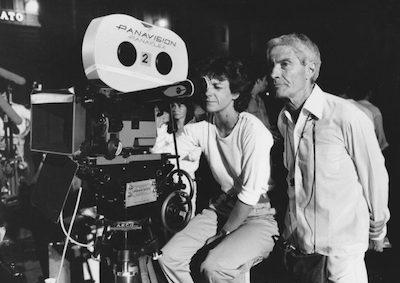“When you look at things for the very first time, you look at them with a particular sense of discovery and curiosity; you dare to look.”—Agnès Godard
During Hollywood’s silent era, women camera operators were known as “cranks” and rarely saw their work documented in studio paperwork or given on-screen credit. One can look to amateur films, home movies and artist-made works for mid-century signs of women behind the camera, but it isn’t until the early 1980s that narrative feature films and documentaries locate women behind the camera in a qualifiable way and begin to consider their artistry. As Hélène Louvart pointed out in a recent Vanity Fair article on female directors of photography, this barrier has been more surmountable in Europe, where women have been empowered to pick up a camera far longer than they have been stateside.
For our first spotlight on a director of photography in our This Woman’s Work series, we’re pulling focus to the prolific French-born cinematographer Agnès Godard, whose four-decade career began in 1982 when she worked second assistant camera on both Joseph Losey’s La truite and Wim Wenders’ The State of Things. Starting her decades-long collaboration with Claire Denis as a camera operator on Chocolat (1988), Godard’s first credit as a full-fledged cinematographer was as one-third of the photography team for Agnès Varda’s affecting love letter to her husband, Jacquot de Nantes (1991). Of the over one-dozen collaborations Godard completed with Denis, the Archive is thrilled to feature three that showcase her ability to evoke nuanced mood through warm colors and tones and her exquisite sense of framing, which Denis would sometimes physically guide from over Godard’s shoulder. For her life’s work, Godard received the 2021 Pierre Angénieux Tribute at the Cannes Film Festival; she boasts quadruple nominations for the coveted César Award, winning once for her work on Denis’ Beau travail (1999). We hope this meager sampling of her immense body of work will rouse the curiosity of our audiences to seek out more films lensed from Godard’s singular, incisive yet delicate point of view.






 Mobile Navigation
Mobile Navigation




